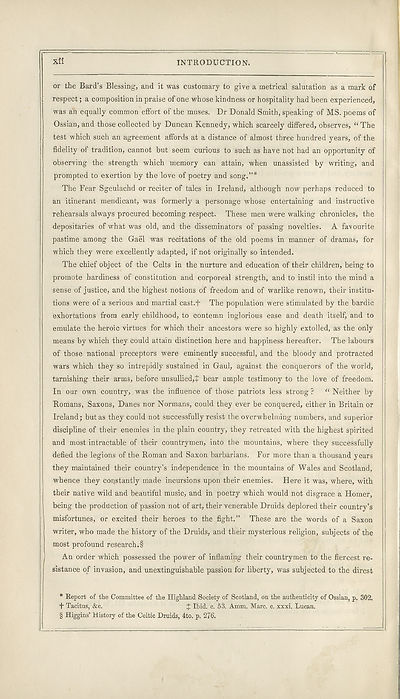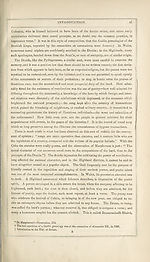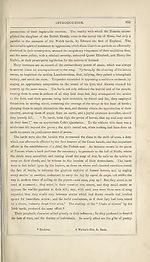Books and other items printed in Gaelic from 1871 to 1900 > Sar-obair nam bard Gaelach, or, The beauties of Gaelic poetry, and lives of the Highland bards
(24) Page xii
Download files
Complete book:
Individual page:
Thumbnail gallery: Grid view | List view

INTRODUCTION.
xli
or the Bard’s Blessing, and it was customary to give a metrical salutation as a mark of
respect; a composition in praise of one whose kindness or hospitality had been experienced,
was an equally common effort of the muses. Dr Donald Smith, speaking of MS. poems of
Ossian, and those collected by Duncan Kennedy, which scarcely differed, observes, “ The
test which such an agreement affords at a distance of almost three hundred years, of the
fidelity of tradition, cannot but seem curious to such as have not had an opportunity of
observing the strength which memory can attain, when unassisted by writing, and
prompted to exertion by the love of poetry and song.”*
The Fear Sgeulachd or reciter of tales in Ireland, although now perhaps reduced to
an itinerant mendicant, was formerly a personage whose entertaining and instructive
rehearsals always procured becoming respect. These men were walking chronicles, the
depositaries of what was old, and the disseminators of passing novelties. A favourite
pastime among the Gael was recitations of the old poems in manner of dramas, for
which they were excellently adapted, if not originally so intended.
The chief object of the Celts in the nurture and education of their children, being to
promote hardiness of constitution and corporeal strength, and to instil into the mind a
sense of justice, and the highest notions of freedom and of warlike renown, their institu¬
tions were of a serious and martial east.+ The population were stimulated by the bardic
exhortations from early childhood, to contemn inglorious ease and death itself, and to
emulate the heroic virtues for which their ancestors were so highly extolled, as the only
means by which they could attain distinction here and happiness hereafter. The- labours
of those national preceptors were eminently successful, and the bloody and protracted
wars which they so intrepidly sustained in Gaul, against the conquerors of the world,
tarnishing their arms, before unsullied,* bear ample testimony to the love of freedom.
In our own country, was the influence of those patriots less strong ? “ Neither by
Romans, Saxons, Danes nor Normans, could they ever be conquered, either in Britain or
Ireland; but as they could not successfully resist the overwhelming numbers, and superior
discipline of their enemies in the plain country, they retreated with the highest spirited
and most intractable of their countrymen, into the mountains, where they successfully
defied the legions of the Roman and Saxon barbarians. For more than a thousand years
they maintained their country’s independence in the mountains of Wales and Scotland,
whence they constantly made incursions upon their enemies. Here it was, where, with
their native wild and beautiful music, and in poetry which wrould not disgrace a Homer,
being the production of passion not of art, their venerable Druids deplored their country’s
misfortunes, or excited their heroes to the fight.” These are the words of a Saxon
writer, who made the history of the Druids, and their mysterious religion, subjects of the
most profound research.!
An order which possessed the power of inflaming their countrymen to the fiercest re¬
sistance of invasion, and unextinguishable passion for liberty, was subjected to the direst
* Report of the Committee of the Highland Society of Scotland, on the authenticity of Ossian, p. 302.
f Tacitus, &c. J Ibid. c. 53. Amm. Marc. c. xxxi. Lucan.
§ Higgins’ History of the Celtic Druids, 4to. p. 276.
xli
or the Bard’s Blessing, and it was customary to give a metrical salutation as a mark of
respect; a composition in praise of one whose kindness or hospitality had been experienced,
was an equally common effort of the muses. Dr Donald Smith, speaking of MS. poems of
Ossian, and those collected by Duncan Kennedy, which scarcely differed, observes, “ The
test which such an agreement affords at a distance of almost three hundred years, of the
fidelity of tradition, cannot but seem curious to such as have not had an opportunity of
observing the strength which memory can attain, when unassisted by writing, and
prompted to exertion by the love of poetry and song.”*
The Fear Sgeulachd or reciter of tales in Ireland, although now perhaps reduced to
an itinerant mendicant, was formerly a personage whose entertaining and instructive
rehearsals always procured becoming respect. These men were walking chronicles, the
depositaries of what was old, and the disseminators of passing novelties. A favourite
pastime among the Gael was recitations of the old poems in manner of dramas, for
which they were excellently adapted, if not originally so intended.
The chief object of the Celts in the nurture and education of their children, being to
promote hardiness of constitution and corporeal strength, and to instil into the mind a
sense of justice, and the highest notions of freedom and of warlike renown, their institu¬
tions were of a serious and martial east.+ The population were stimulated by the bardic
exhortations from early childhood, to contemn inglorious ease and death itself, and to
emulate the heroic virtues for which their ancestors were so highly extolled, as the only
means by which they could attain distinction here and happiness hereafter. The- labours
of those national preceptors were eminently successful, and the bloody and protracted
wars which they so intrepidly sustained in Gaul, against the conquerors of the world,
tarnishing their arms, before unsullied,* bear ample testimony to the love of freedom.
In our own country, was the influence of those patriots less strong ? “ Neither by
Romans, Saxons, Danes nor Normans, could they ever be conquered, either in Britain or
Ireland; but as they could not successfully resist the overwhelming numbers, and superior
discipline of their enemies in the plain country, they retreated with the highest spirited
and most intractable of their countrymen, into the mountains, where they successfully
defied the legions of the Roman and Saxon barbarians. For more than a thousand years
they maintained their country’s independence in the mountains of Wales and Scotland,
whence they constantly made incursions upon their enemies. Here it was, where, with
their native wild and beautiful music, and in poetry which wrould not disgrace a Homer,
being the production of passion not of art, their venerable Druids deplored their country’s
misfortunes, or excited their heroes to the fight.” These are the words of a Saxon
writer, who made the history of the Druids, and their mysterious religion, subjects of the
most profound research.!
An order which possessed the power of inflaming their countrymen to the fiercest re¬
sistance of invasion, and unextinguishable passion for liberty, was subjected to the direst
* Report of the Committee of the Highland Society of Scotland, on the authenticity of Ossian, p. 302.
f Tacitus, &c. J Ibid. c. 53. Amm. Marc. c. xxxi. Lucan.
§ Higgins’ History of the Celtic Druids, 4to. p. 276.
Set display mode to:
![]() Universal Viewer |
Universal Viewer | ![]() Mirador |
Large image | Transcription
Mirador |
Large image | Transcription
Images and transcriptions on this page, including medium image downloads, may be used under the Creative Commons Attribution 4.0 International Licence unless otherwise stated. ![]()
| Permanent URL | https://digital.nls.uk/109809361 |
|---|
| Description | Out-of-copyright books printed in Gaelic between 1631 and 1900. Also some pamphlets and chapbooks. Includes poetry and songs, religious books such as catechisms and hymns, and different editions of the Bible and the Psalms. Also includes the second book ever published in Gaelic in 1631. |
|---|

